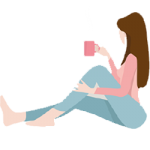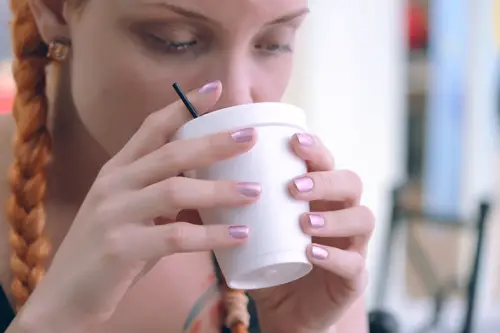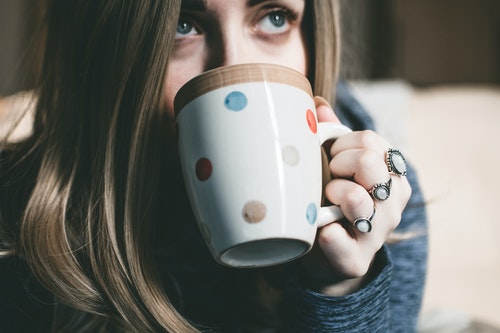
Tea will not give you anxiety, but it can make you more anxious if you are prone to mental health issues.
For some of my clients, maintaining a healthy diet is a good way of managing certain symptoms of mental health conditions. As such, I have been asked will tea give me anxiety. I decided to research the topic for a more scientific approach.
In this post, I will explain why tea may increase symptoms of anxiety as well as what you can do to stay in control. Keep reading!
Contents
It is important that it isn’t necessarily the tea that can trigger your anxiety. Rather, it is the caffeine in the tea that you need to be focused on.
In low to moderate doses, caffeine can be beneficial. Not only does it boost alertness and concentration, but it has also actually been linked to fewer cognitive failures, less depressive episodes, and a lowered risk of suicide.
In high amounts, though, one of the more common side effects of caffeine is increased anxiety. In some instances, it may also extend to manic or psychotic symptoms. These symptoms were more likely with individuals who had been diagnosed with panic disorders or social anxiety disorders.
There is also some evidence to show that caffeine can increase the feelings of anxiety in individuals who have already been diagnosed with mental health conditions. This can be coupled with a rise in sleep-related issues as well.

You may be wondering if all types of tea can trigger your anxiety. Well, this isn’t necessarily the case.
For one thing, only true teas contain caffeine. Herbal teas don’t contain any. However, this doesn’t necessarily mean that they may not cause feelings of anxiety. It is important to always speak with a medical professional before adding herbal teas to your diet to guarantee that there won’t be any contraindications.
Furthermore, each type of tea contains a different amount of caffeine per cup. White tea has the least amount and black tea has the most. Of course, the exact quantity can vary across brands. Even decaf tea contains some caffeine.
If you do want to switch to decaf, always check the caffeine level for a variety of brands and compare them. Some manufacturers can have shockingly high caffeine content in their decaf options as well.
How much tea can you drink without worrying about any adverse reactions?
For the most part, total consumption of less than 400mg of caffeine is considered to be safe.
Thus, you can drink several cups of white tea, two or more cups of green tea, and one or two cups of black tea each day.
That being said, you should be aware that some people are a lot more sensitive to caffeine than others. Due to this, they may begin to experience side effects at significantly lower doses.
Now, how do you know which category you fall into?
Unfortunately, this does involve some trial and error. If you already drink several cups of tea a day, take note of how you feel. Do you notice that your levels of anxiety increase the more tea that you drink? If the answer is yes, then it is time to cut down.
If you don’t drink tea yet, then it is a good idea to start with just a single cup a day. Keep in mind that you can build up a tolerance to caffeine, which means that you may want to increase your intake later on if you aren’t experiencing the same benefits.
Nevertheless, it is a good idea to keep your caffeine consumption as low as possible to avoid taking this risk.

If you have decided that caffeine is making your anxiety worse, then you may want to give your daily tea consumption up. Before you go cold turkey, though, you should be aware that one of the consequences of caffeine withdrawal is anxiety!
Caffeine dependence is a very real phenomenon with your brain and body becoming addicted to the substance. When you stop drinking tea without any warning at all, this can cause feelings of anxiety to develop.
Don’t worry, though, all hope isn’t lost.
In case you are thinking of reducing your tea consumption or giving it up altogether, make sure to do this slowly over an extended period of time. If you can manage it, cut the number of tea beverages that you drink by half. Otherwise, lower the amount by what you can stand to give up.
Do this for a few days to a week and then lower your consumption again. Once you are comfortable with this quantity, lower it again. Continue this until you have given up the caffeine completely.
Although it is easy to automatically assume that coffee contains more caffeine than tea, this isn’t always the case. In some instances, some brands of green tea and black tea are on par with coffee. Therefore, there is no way to make this comparison generally.
Nonetheless, tea – green tea in particular – does have more calming components than coffee. These can actually help to offset the more anxiety-inducing qualities of caffeine and put you in a better mood.
Remember, you do have to drink green tea for a while, around several weeks at a time before beginning to notice this effect. Also, it is important to monitor how you feel when drinking the tea. If you do feel more relaxed, great. If not, you may want to consider lowering your consumption.
Above all, make sure to take note of your daily caffeine consumption. Always drink the lowest amount possible. And, make sure not to drink more than two to three cups a day.
Now, tea will not give you anxiety, but it can exacerbate certain symptoms. This is only likely to occur when you have drunk too much tea, but those who are sensitive to caffeine may need to stick to lower amounts.
Did you enjoy this post? Then make sure to check out our Pinterest page. We have tons of more interesting posts for you there!
